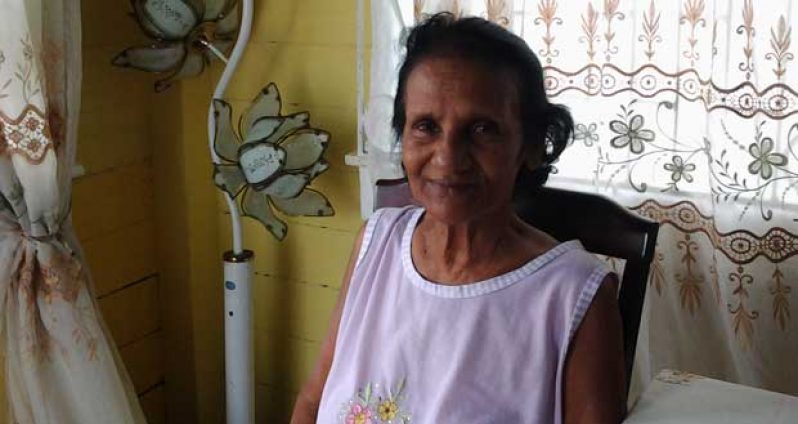…after raising her six children on her own
TO earn a dollar back in those days, she had to get her soap, onion and garlic, among other items, ready for 4 a.m. and wait on the Ministry of Public Works trailer in Leguan to help her get to ‘back part’ of the island, as it was commonly referred to. Then, as she made her way back home on foot, she would go house to house, with the bag atop her head, to sell the items. She struggled, but never complained because she believed it was important to care for the needs of her six children, even if her husband would not help.

Meet 72-year-old Chandrawattie Roopwah, known as ‘Aunty Pounce’ and ‘Granny.’ She is now grandmother to 13 and great grandmother to six.
Granny grew up in La Bagatelle on the Essequibo island of Leguan, and has lived there all her life. She managed to attend a school in Maryville, but had to drop out to help her parents care for her other siblings when they went to cut rice.
In those days, there was no nursery school and children had to wait until they were 5 or 6 to begin their education. Granny fondly recalled the five years she spent at a school in Maryville. The students wrote the ‘School Leaving’ Exams after Standard Six, but Granny said she dropped out at Standard Five.
“I never failed, but in Fifth Standard was the first time I failed. I thought the little children would come and reach me up, so I felt shame and decided not to go back.” Had she not had to stay at home to help out, though, she is sure she would have passed her exams with flying colours.
Raising her children

Granny had married life really hard, because, she said, her husband was not as hard-working as she. In fact, he worked when he felt like it and he drank a lot of alcohol, even raising his hands at her at times.
Being the strong-willed and somewhat independent individual that she is, Granny decided to leave him and assumed the mantle of looking after herself and the children on her own.
“I had to work hard to care for so many children and they were not many years apart. At one time, when I had to take up work in Hogg Island, I had to take some of them with me. I even had to work with a big belly. The work was hard, not like today, when things are much easier. We had to go through rain and lightning, and walk far places to get work.
“What I pass through, I wouldn’t want my worst enemy to pass through ,” she explained during her interview with the Chronicle.
But at the time she worked as a labourer, cutting and planting rice, her relatives in Hogg Island had been very supportive.
Despite being poor and having to endure the difficulties that flowed from this, Granny took out a bank book at the Post Office, between her and one of her children. When she realised she had to separate from her husband, she wasn’t so worried because she knew she was hard-working. “I know I can work. I was both mother and father. So I wasn’t worried how I would make it.”
She recalled how she bought one acre of land for $400 without having a cent in her pocket. “People knew I was honest so they allowed me to work and pay. They saw how hard I worked and how many children I had. Every crop, I paid something.”
Granny worked diligently on the land, ensuring she sprayed it well and did what was necessary so as to get as much returns from it as possible. She also kept chickens, planted a kitchen garden, and did sewing for the family.
Despite having to spend so much of her time working to maintain the family, Granny never neglected her children. She trained them well and did her best to instill in them moral values.
“People always admired my children. I always liked to have them clean and neat. They were up-to-date and well-trained. If I just looked at them, they already knew what that look signified. I was able to have all my children under control. By 6:00 p.m., my girl children couldn’t be on the bridge. And they were very obedient.
Today, two of her children, Anita and Helen, live on the island with Granny; two more, Modoes and Deokie, live in Trinidad; Doreen resides in Venezuela and Dasratt in Cummings Lodge.
Life is different now
Granny also remembered how life under the government of the day was hard and contributed to her many woes. “You had to go in the night to put down your name for two pounds of flour and then go line up next day for it.”
But life is different now, she said. “I’m still working, but it’s not so stressful. I never used to go anywhere but now I can go anywhere I feel. I’m free now, having raised a grand and now raising a great grand. I have the time to visit my relatives when I feel like, and I still like to keep fit. I still plant, weed, fork, spray; I still do everything for myself.”
Granny is surrounded by many of her relatives in Leguan and is now a happy soul, enjoying the rest of her life.
(By Telesha Ramnarine)




.jpg)










